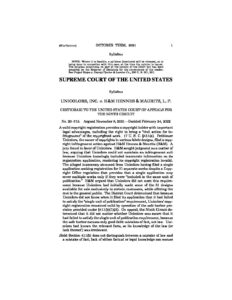By Kevin Parks
In what may well be retiring Justice Stephen Breyer’s final copyright opinion, the U.S. Supreme Court has ruled that unknowing mistakes of either fact or law do not invalidate a copyright registration, reversing a Ninth Circuit holding to the contrary in Unicolors, Inc. v. H&M Hennes & Mauritz, L.P.
For copyright claimants, obtaining copyright registrations is an all-important prerequisite to filing suits for infringement, and to seeking so-called “statutory damages,” which can be onerous. Accuracy in copyright registration data is therefore critical, such that the world (including would-be copyists) can rely on specific and reliable claims of ownership and scope of rights.
The “safe harbor” provisions of §411(b)(1)(A) of the Copyright Act accommodate these competing interests, by allowing courts to invalidate registrations that include “inaccurate information” (which would have prevented issuance), but only if the applicant knew of the inaccuracy. The Unicolors decision clarifies that the safe harbor applies to unknowing mistakes of both fact and law.
Unicolors successfully sued retail giant, H&M, for infringing its apparel designs, earning an $800,000 award. On appeal, H&M argued that the asserted copyright registration was invalid because it contained inaccurate information concerning the “publication” of plaintiff’s designs—specifically, Unicolors had sought registration for 31 separate designs, but not all of them had been “included in the same unit of publication,” as required by Copyright Office regulations.
Technically, H&M was correct; Unicolors had released only some of the designs to the general public, while making others available exclusively to certain customers. On this basis, the Ninth Circuit reversed, holding that the safe harbor provisions did not apply to matters of law, such as publication.
Justice Breyer’s majority opinion found the result harsh and unwarranted, holding that §411(b) “does not distinguish between a mistake of law and a mistake of fact.” The Court reasoned that copyright applications are hybrid documents, calling for information of both a factual and legal nature—for example whether a given work is made “for hire,” is “derivative” of an earlier work, and if and when it was “published.” In this context, holding copyright applicants, many of whom are laymen, to strict standards of both factual and legal “accuracy” would be unfair and contrary to policy.
Notably, the status of Unicolors’ registration remains an open question on remand. Presumably H&M will renew its motion to invalidate the registration, and the District Court will decide, on all the facts, whether Unicolors may take refuge in the safe harbor, or if it was sophisticated enough to “know” that its application contained inaccurate information as to publication of its various designs.


